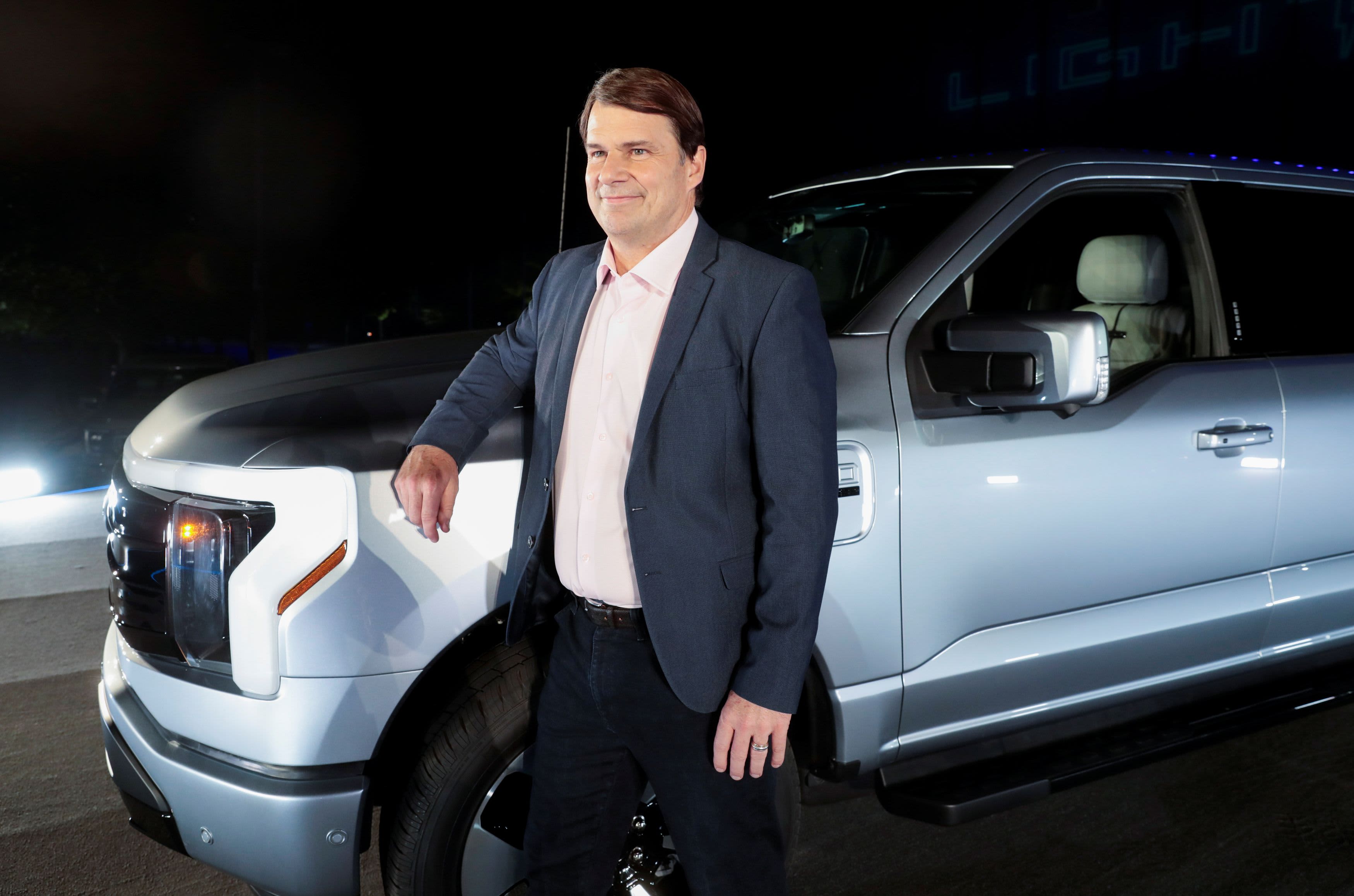Ford Motor dealer Marc McEver was taken back when he heard about the automaker’s plans to separate its electric vehicle and legacy businesses as part of a restructuring under CEO Jim Farley.
The owner of Olathe Ford Lincoln near Kansas City, Kansas, heard the news around 6:30 a.m. CST last Wednesday and “was calling Detroit” within 15 minutes to try to understand what was happening.
“When it was first announced, I was pretty set back,” McEver said. “I was freaking out before I had even shaven that day.”
But after speaking with Ford officials since then, McEver, whose dealership specializes in commercial and fleet vehicles, is now excited about the plans.
“After talking to some of the people at Ford, I feel a lot better,” he said. “All this is pretty ingenious.”
Soothing concerns of dealers such as McEver is expected to be crucial for Ford executives Saturday during a meeting of the company’s franchised dealers at the National Auto Dealers Association Show in Las Vegas. The event annually attracts thousands of franchise dealers, including many of Ford’s roughly 3,100 retailers.
Farley caused waves across Wall Street and the automotive industry last week when he announced the separation plans. He called them “one of the biggest changes” in the history of the more than century-old company, including dealers “specializing” in certain vehicles.
Farley said some dealers such as McEver may specialize in fleet vehicles, while others only do electric vehicles or sales to retail customers.
“We’re going to bet on the dealer franchise system,” Farley said. “That’s a different bet than I hear from others. But we’re going to do it by asking them to specialize.”
‘Better than Tesla’?
Farley’s plans add to significant pressures and changes for franchise dealers, which many Wall Street analysts view as a negative for legacy automakers such as Ford when it comes to EVs. They argue the system eats into vehicle profits and can provide more inconsistent experiences compared to EV start-ups and Tesla, which own their stores and sell directly to consumers.
Those who want to sell EVs may have to operate in completely new ways, including online ordering, commitment to not carrying any inventory and selling at transparent non-negotiable prices, as some dealers have taken advantage or high demand and low vehicle inventories to mark up prices.
“In the next 60 days, we’re going to be out talking to all of our dealers around the world, and developing a pithy list of standards for a new experience that’s going to be better than Tesla,” Farley said.
Ford and other legacy automakers are contractually obligated to sell through franchised dealers. Many states also have laws that block direct sales of vehicles by automakers to consumers.
Franchise dealers for decades have fought to keep the traditional selling system in place. Traditional automakers view dealers as partners that are particularly important when it comes to servicing vehicles and community involvement.
Big meeting
Ford will attempt to address any and all concerns about the announced plans at Saturday’s NADA meeting, said spokesperson Debra Hotaling.
“That’s why we do this. We work really hard to talk to our dealers and listen to them,” she said, reiterating Farley’s comments about working with its dealers on these plans.
The changes could cost dealers millions of dollars in upgrades depending on their size. They also could force some individual dealers to sell to larger, sometimes publicly traded companies such as AutoNation and Lithia Motors.
Consolidation of dealer networks has been a major trend in recent years amid trying times during the coronavirus pandemic and automakers pushing dealers to invest more in EVs.
Ryan LaFontaine, CEO and co-owner of LaFontaine Automotive Group in Michigan, says he’s excited about EVs, but would like to know some additional details about Ford’s plans and requirements.
“It’s a big change, but it’s going to be something that we embrace and we’re excited about,” he said. “It makes sense, but we’re still waiting as dealers to understand the full impact.”
LaFontaine said his company, which has three Ford dealerships and 26 other stores in Michigan, is “all-in” when it comes to EVs.
The company, which sold nearly 44,000 vehicles last year, has already invested close to $1 million in its transition to EVs. His franchises range from the Detroit automakers and Toyota to Volvo-backed EV start-up Polestar.
“It’s an all-in play. All manufacturers are pretty much taking their entire portfolio, whether it be today or in the near future, to be EVs,” he said. “If you’re not adapting, really what you’re doing is saying you’re not going to proceed forward with Ford or believing in the vision they have. Not just Ford, all manufacturers.”
